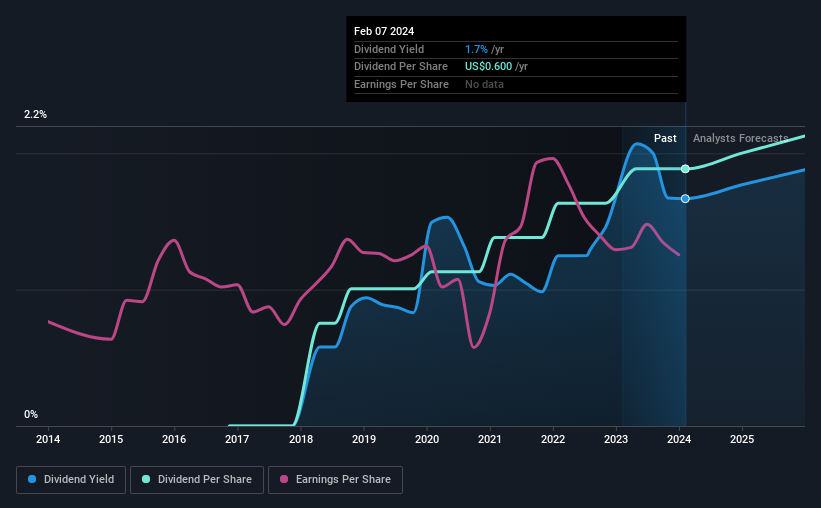FB Financial Corporation (NYSE:FBK) Goes Ex-Dividend Soon
It looks like FB Financial Corporation (NYSE:FBK) is about to go ex-dividend in the next four days. The ex-dividend date is one business day before the record date, which is the cut-off date for shareholders to be present on the company's books to be eligible for a dividend payment. The ex-dividend date is important because any transaction on a stock needs to have been settled before the record date in order to be eligible for a dividend. Therefore, if you purchase FB Financial's shares on or after the 12th of February, you won't be eligible to receive the dividend, when it is paid on the 27th of February.
The company's upcoming dividend is US$0.17 a share, following on from the last 12 months, when the company distributed a total of US$0.60 per share to shareholders. Looking at the last 12 months of distributions, FB Financial has a trailing yield of approximately 1.7% on its current stock price of US$35.99. Dividends are an important source of income to many shareholders, but the health of the business is crucial to maintaining those dividends. So we need to check whether the dividend payments are covered, and if earnings are growing.
See our latest analysis for FB Financial
Dividends are usually paid out of company profits, so if a company pays out more than it earned then its dividend is usually at greater risk of being cut. FB Financial is paying out just 23% of its profit after tax, which is comfortably low and leaves plenty of breathing room in the case of adverse events.
Generally speaking, the lower a company's payout ratios, the more resilient its dividend usually is.
Click here to see the company's payout ratio, plus analyst estimates of its future dividends.
Have Earnings And Dividends Been Growing?
Stocks with flat earnings can still be attractive dividend payers, but it is important to be more conservative with your approach and demand a greater margin for safety when it comes to dividend sustainability. If business enters a downturn and the dividend is cut, the company could see its value fall precipitously. With that in mind, we're not enthused to see that FB Financial's earnings per share have remained effectively flat over the past five years. Better than seeing them fall off a cliff, for sure, but the best dividend stocks grow their earnings meaningfully over the long run.
Many investors will assess a company's dividend performance by evaluating how much the dividend payments have changed over time. Since the start of our data, six years ago, FB Financial has lifted its dividend by approximately 16% a year on average.
Final Takeaway
Should investors buy FB Financial for the upcoming dividend? FB Financial's earnings per share have not grown at all in recent years, although we like that it is paying out a low percentage of its earnings. At best we would put it on a watch-list to see if business conditions improve, as it doesn't look like a clear opportunity right now.
If you want to look further into FB Financial, it's worth knowing the risks this business faces. To help with this, we've discovered 1 warning sign for FB Financial that you should be aware of before investing in their shares.
A common investing mistake is buying the first interesting stock you see. Here you can find a full list of high-yield dividend stocks.
Have feedback on this article? Concerned about the content? Get in touch with us directly. Alternatively, email editorial-team (at) simplywallst.com.
This article by Simply Wall St is general in nature. We provide commentary based on historical data and analyst forecasts only using an unbiased methodology and our articles are not intended to be financial advice. It does not constitute a recommendation to buy or sell any stock, and does not take account of your objectives, or your financial situation. We aim to bring you long-term focused analysis driven by fundamental data. Note that our analysis may not factor in the latest price-sensitive company announcements or qualitative material. Simply Wall St has no position in any stocks mentioned.

